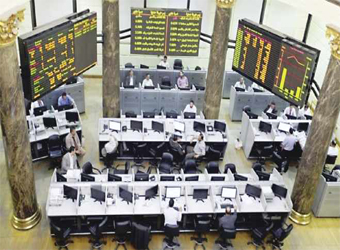During the first quarter of 2013, the Egyptian Exchange has incurred losses of EGP 20 billion as the capital market has reached around EGP 355 billion by the end of the Q1/2013, compared to an earlier quarter’s EGP 375 billion, representing a decline of 6%.
EGX’s substantial losses come amidst a number of political turbulent incidents in the country such as; the salafist groups’ sit-in outside the Egyptian Media Production City, the presidential palace bloody clashes, Port Said football massacre court hearing repercussions, the country’s prosecutor-general controversial saga.
In addition, a number of firms’ announcements have reversely affect the EGX’s performance notably, Orascom Telecom Holding’s potential market exit amid Cypriot company’s tender offer, Orascom Construction Industries’ tax disputes, and acquisition deal of National Société Générale Bank by Qatar National Bank (QNB),
Through Q1/2013- the main index, EGX30 dived by 6.66% to end at the level of 5.099 points. For the mid- and small-cap index, the EGX70 sank by 7.46% to close at 441 points; while, the price index EGX100 pushed down by 7.88% to conclude at the level of 737 points.
In Q1/2013, EGX’s traded volume reached around 7.043 million securities worth EGP 51.3 billion, exchanged through 1.120 thousand transactions. Noting that, through Q4/2012 the traded volume had reached 8.673 million securities worth EGP 41.1 billion, exchanged through 1.520 thousand transactions.
Elsewhere, the traded volume for the EGX of SMEs – NILEX through Q1/2013 has amounted to 25.8 million securities worth EGP 63.1 billion, exchanged through 9.904 transactions.
For EGX’s Over-The-Counter – OTC trading, the shares had seized 80.39% out of the total traded value; while traded value of the bonds represented 19.61% in Q1/2013.
Investors Activities:
Local investors led the market activity through Q1/2013 , seizing 76.49% of the total market; while non-Arab foreigners and Arabs seized 16.58% and 6.93%, respectively of the total market, after excluding the deals.
Excluding the deals, the non-Arab foreigners were net buyers in Q1/2013 , with a net equity of EGP 6.41 million; while Arabs were net sellers, with a net equity of EGP 498.72 million.
During Q1/2013, institutions had seized 54.29% of the EGX trading; while individuals had 45.71%.
Institutions were net buyers, with a net equity of EGP 800.82 million in 3 months, after excluding the deals.
EG-Finance stated that the EGX has gone through severe clear volatility driven by the country’s economic and political situation besides the security challenges which contribute to pushing the investors away from the market.
The EGX indices’ performance have reflected the investors’ worries and apprehension due to the political tensions and the state of instability. The country’s state of instability have driven the investors to adopt random unstudied decisions due to the future vision haziness.
EG-Finance also noted that like all the economic indicators, the EGX is highly sensitive to any negative developments in the country. Therefore, officials have to adopt a clear well-defined vision for the future. The EGX will not be alluring more investments without having security and political stability in the country.
The political stability shall remarkably contribute to the market’s recovery.
